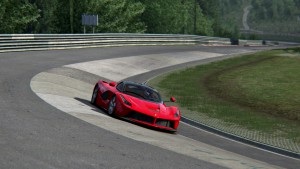A Sudden End of Flow
During my ongoing literature review I often discover interesting facts about things I’ve never thought about. Sometimes I can connect these facts with my own observations: The result is mostly a completely new idea why things are as they are. Maybe these ideas are new to you, too. Therefore I’ll share my new science based knowledge with you!
This week: This time, I think about the reason why spinning out or losing control in a racing simulation is a very disappointing experience.
While in a state of flow, a person is totally immersed in an activity and derives fun from the performance of it. Furthermore, the state of flow is a very rewarding experience that motivates a person to continue with an activity in order to remain longer in this state. That way, flow can be seen as a state of happiness. Ending or changing the activity are not a good option as it would result in the end of flow.

Ferrari LaFerrari in Assetto Corsa
This of course also applies to playing computer games. Players can get into the state of flow when a computer game provides new challenges they can barely overcome and informs them about their progress towards the completion of the goals. As a result of this, winning, failing or changing the game are no satisfying options as this would result in the end of the flow experience.
Personally, while playing racing simulations, especially in the case of DiRT Rally, I was surprised why it really annoyed me when I lost control over the car or caused my car to spin for various reasons. Recently, I realized that this strong disappointment was not just a result of the fact that I did a mistake but an effect of the instant end of my flow experience.
As racing simulations easily allow me to play at the very limit of my driving skills, they are highly flow inducing virtual environments. Operating the virtual race cars at their limits demands my full concentration and, by indicating the time I needed to complete a lap or a stage, respectively, I constantly receive immediate feedback about my performance. As a result, I am immediately in the state of flow when I start to drive one of those cars.
However, spinning out and subsequently getting off the track is not a soft transition out of the immersion but an abrupt end of it. This sudden end of flow immediately results in a short but high degree of frustration as it is a completely unsatisfying outcome. Simultaneously, it demonstrates the strong motivational effects of game flow.
In the end, since having identified the reason why I am all the time very disappointed after an incident, I just need to smile when it happens to me again as it then makes me feel very connected to my research.

